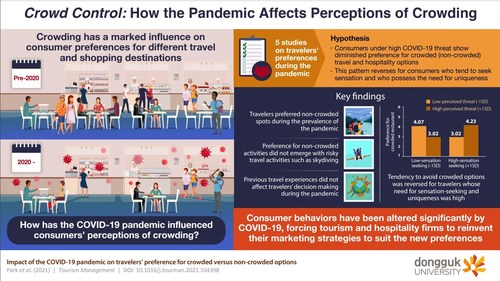SEOUL, South Korea, Feb. 17, 2022 /PRNewswire/ — COVID-19 has wreaked havoc on the tourism and hospitality industry, magnifying consumers’ adverse responses to crowding. Now, Dongguk University researchers demonstrated that consumers display diminished preferences for crowded venues, especially under high salience of COVID-19. However, this tendency reversed in consumers seeking unique, non-conforming experiences. These findings would help marketers reinvent their strategies to adapt to the new preferences of the traveler, such as promoting the notion of vacancy and unpopularity in advertisements for venues.
When choosing a travel and hospitality destination, one of the things we often consider is the size of the crowd it pulls in, as large crowd often indicate positive attributes, including popularity, high quality, and a feeling of assurance. Now, due to the COVID-19 pandemic, avoiding crowded spots has risen several ranks on the priority lists of consumers. Fearing the risks of contracting the virus, people have been avoiding urban settings and popular tourist destinations. But is this trend universal? Does it apply to all kinds of travelers? Are there some tourist destinations or activities that travelers take part in regardless of the crowd?
These are the few questions that this study by a team of researchers, including Associate Professor Jacob Chaeho Lee from Dongguk University, tries to answer in a new study published in Tourism Management.
Based on the literature combined with empirical evidence from five survey-based experimental studies, the team hypothesized and demonstrated that, consumers under high salience of the COVID-19 pandemic display a diminished preference for crowded destinations. However, they also found that consumers who tend to seek sensation and have need for uniqueness show the opposite pattern. They also proved that this effect remains consistent across different travel and hospitality options regardless of the participants’ previous travel experiences.
So, how does this study contribute to the recovery of the tourism and hospitality industry?
Hailing these results, Dr. Lee says, "Our findings show that tourism and hospitality firms need to re-evaluate and reinvent their marketing strategies to adapt to this new consumer psychology and behavior. For example, firms may need to stop promoting the notion of crowding, popularity, or being trendy in the advertisements, social media, and review sites about their venues." Their findings also suggest that during the pandemic, firms need to create new opportunities to attract consumers who tend to seek high levels of sensation and uniqueness in their consumption.
The findings of the present study would greatly help tourism and hospitality firms to bounce back from the losses caused by the pandemic.
Reference
Title of original paper: Impact of the COVID-19 pandemic on travelers’ preference for crowded versus non-crowded options
Journal: Tourism Management
DOI: https://doi.org/10.1016/j.tourman.2021.104398
About Dongguk University
Website: http://www.dongguk.edu/mbs/en/index.jsp
Contact:
Jacob (chaeho) Lee
+82 2-2260-3740
330037@email4pr.com
SOURCE Dongguk University

